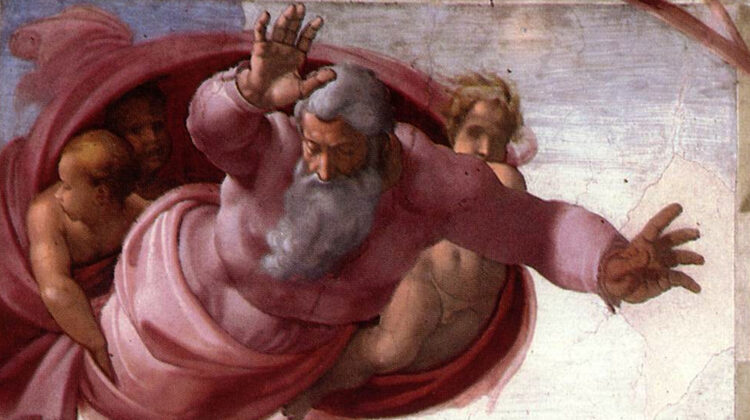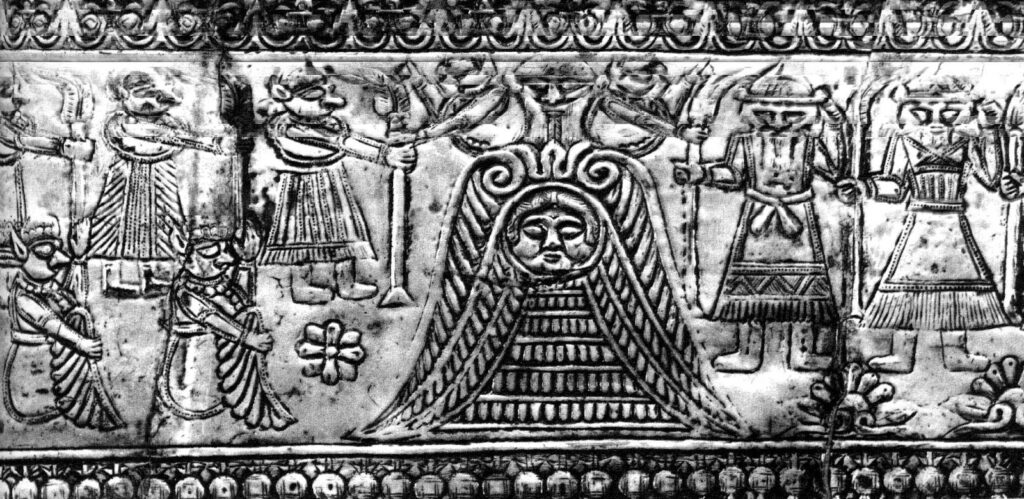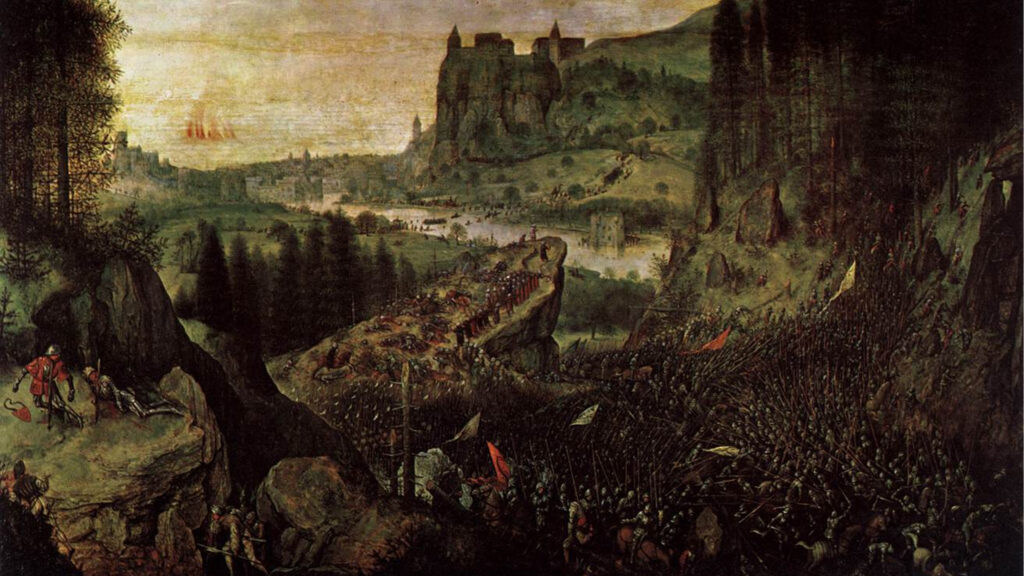
Yhwh, an evil and bloodthirsty God?
This article is a first step in following Satan’s trail, and draws mainly on the Old Testament to discover that, when all is said and done, YHWH, the God of the Jews, and Satan have much more in common than is normally acknowledged.
This text is dedicated to a God who is very far from the good and loving being that Jesus preached. The God of the Old Testament, on the other hand, is all too often cruel and evil, so much so that the first Christians and the Gnostics had often wondered, with great embarrassment, if the God of the Jews and that of Christ were the same deity. Coming to opposite conclusions.
If we are to understand the origins of Satan, however, we must start from here.
All the most ancient civilisations have always clearly perceived the presence of good and evil in the universe. If everything proceeds from a single principle called God, this God can only be ambivalent, good and evil at the same time. In short, divinity is a coincidence of opposites.
In Hinduism, Brahmā ‘creates the evil and the good; the affable and the cruel; truth and falsehood; life and death’.
The attempt to understand the relationship between God and the evil that dominates the universe is called theodicy, a term introduced by the philosopher G.W. Leibniz (1646-1716) who defines it as the ‘doctrine of the right and justice of God’ that aims at a ‘justification of God’ with respect to the problem of the existence of evil in the world and of human free will.
Why does God allow evil to exist or permit it to be committed? This is the fundamental question that has always tormented man. It is a question that is not easy to answer.
Polytheistic religions sometimes express the contrast between good and evil as a war between good and bad gods. It should be noted that when a civilisation replaces one group of divinities with another, the losing gods find themselves relegated to the role of demons.
This is what happened when the Christians transformed the pagan gods into evil spirits and the devil’s offspring. Or in ancient Persia when the Ahura gods defeated the Daēva. The latter were reduced to evil spirits at the service of the Lord of Darkness, while the Ahura found their guide in the exalted Ahura Mazdah, the god of light.
The prophet Zarathustra, in short, stated that evil is not an aspect of the good God, but a totally separate element. The good god Ahura Mazdah (Ormazd in Persian), the god of light, was opposed to Ahriman (or Angra Mainyu), the god of darkness and evil. This is what is known as dualism, where the two principles of good and evil are personified as two opposing and independent principles. Dualism is the only way to preserve the goodness of God uncontaminated; that is, to keep evil away from him.

This is an extreme that is opposed by monism, that is, the concept of a God that encompasses everything in Himself, including good and evil. Between these two extremes, there is actually a vast range of intermediate solutions adopted by every religion.
Christianity, and before it Judaism, developed the concept of the Evil One, Satan, the one who hinders, in a long and not always clear process. This process began in the Old Testament period and ended in apocalyptic Judaism, essentially between the 1st century BC and the 1st century AD, and in early Christianity, in the thinking of the Church Fathers.
As in most ancient, if not primitive, religions, the God of the Old Testament was still seen as being responsible for the entire universe. And, therefore, as a coincidence of opposites. He was a benevolent God but with a dark, even evil side.
In Genesis 1, he repeatedly rejoices in the goodness of Creation.
‘And God saw that it was good‘ (Genesis 1,10.12.18.21.25).
‘God saw all that he had made, and behold it was very good’ (Genesis 1,31)
But in Isaiah 45:7, for example, he himself states:
‘I form the light and create darkness,
I bring prosperity and create disaster,
and do as I please.”
It is an ambivalence, that of God, which willingly results in a cruelty that reflects the savage and predatory customs of the ancient Israelites.
In Deuteronomy 32:41-42 his are not the words of the loving god of Jesus, but rather those of a bloodthirsty pagan deity:
‘When I have sharpened my flashing sword
and my hand is stretched out in judgement,
I will take vengeance on my adversaries
and repay those who hate me.
I will make my arrows drunk with blood
and my sword shall devour flesh
with the blood of the slain and the captives
and the heads of the enemy’s princes.”
Subsequently, an ‘evil spirit’ sent by God will act on Saul:
‘But the Spirit of the Lord departed from Saul, and an evil spirit from the Lord terrorised him’
(1 Samuel 16,14)
In this case, it is clearly stated that both spirits, positive and negative, both come from YHWH.

God was very demanding of the people of Israel. He had established a pact with them and anyone who violated the Covenant was to be destroyed.
For example, when an Israelite kept the spoils of a conquered city for himself instead of giving them into the custody of his priests, God punished all the children of Israel by causing them to be defeated by the Canaanites. When Joshua, in despair, asked what should be done, God replied that ‘I will not be with you anymore if you do not destroy the accursed thing that is among you’ and that lots should be cast to discover the guilty party. The lot fell on Achan. The Israelites led him to the valley of Achor where they stoned him to death and covered him with stones. After this, ‘the Lord relented in the punishment he had threatened to inflict’ and gave the city of Ai to Israel. He then ordered that, after killing the entire army that had come out against them, they were to kill all the inhabitants, without exception: ‘All who were killed on that day, both men and women, were twelve thousand; all of them, all the people of Ai’ (Joshua 8,25). And then he ordered everything to be set on fire.
The Israelites committed the same massacres in practically every city they conquered, like Jericho where ‘they killed all the people in the city, both young and old, both man and woman, and they put the oxen and the donkeys to the sword’ (Joshua 6, 21). Or like Hazor where: ‘He put all who were there to the sword, utterly destroying them; he left no living soul. He burnt Hazor’ (Joshua 11,11).
But in the attitude of God-YHWH there is not only violence and a thirst for blood. There is something much more devious, almost a complacency in inflicting suffering.
In the case of the Canaanite cities, of which we have reported only a few examples, but the list is impressive, the Israelites could however claim that it wasn’t their fault and that, on the contrary, all this violence was part of the divine plan:
“For the Lord had sought to put them to death by famine. Then the Lord said to Moses, “The Israelites have acted so wrongly and have been so stubborn; now I will punish them with a famine that will destroy them, until there are no survivors among them, as I did at the time I punished them with famine during the forty years I took them around the desert”
(Joshua 11,20)
In Genesis 12:10, God urges Abraham, while he is in Egypt to escape a famine, to pretend that Sarah is his sister instead of his wife. Pharaoh believes Abraham’s lie in good faith and asks for Sarah as a bride, unleashing God’s wrath that strikes him and his family with serious illnesses.
A similar story is told in Exodus, where God strikes the land of Egypt with a series of plagues. Each time Pharaoh is on the verge of giving in and allowing the Jews to leave his land, God intervenes, hardening the monarch’s heart and making him turn back. Thus attracting further plagues until the killing of all the firstborn, sparing only the children of Israel.

But the same ambivalent attitude towards God-YHWH is also reserved for the people of Israel. In the second book of Samuel, God orders David to carry out a census, despite having previously declared that such a census was a sin: “Again the anger of the Lord burned against Israel, and he incited David against them, saying, “Go, number Israel and Judah” (II Samuel 24,1). It’s obvious that God is just looking for an excuse to punish Israel. And in fact, in the end David is forced to choose between the following punishments: seven years of famine in the country, three months of fleeing from the enemy or three days of plague. David, desperate, chooses the third option and seventy thousand die from the epidemic.
It is interesting to note that in the equivalent passage, in 1 Chronicles 21:1, we already see an attempt to remove from God the responsibility for what happened. The chronicler must have reasoned that YHWH could not have wanted David to sin. It must have been an evil entity distinct from God: ‘Satan rose up against Israel and seduced David into taking a census of Israel’. And so David, despite Gioab’s hesitation, persisted with the project, thus incurring God’s wrath.
So far, the figure of Satan, the devil, is only in its infancy. But his evolution, which will lead him to become the prince of evil spirits and the personification of the dark side of God, is only just beginning. But we’ll talk about this in another post.





